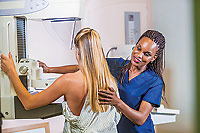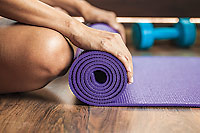|
|
HEALTHY HAPPENINGS October 2020
|
| Mom has Breast Cancer… A Personal Journey |
The first week in March my mom felt a lump in her breast. She scheduled a mammogram, that led to an ultrasound, that led to a biopsy, and on March 18, 2020, Mom was officially diagnosed with breast cancer. With the Pandemic that was racing across the world they wanted to wait until things settled some before doing surgery. Fortunately, mom’s breast cancer was the type that responded to Hormone Reduction medications. To put it in simple medical terms, the tumor was about the size of a “Twinkie.” She started on daily medications and we watched and waited. The pet scans all looked good. The medication seemed to be working and surgery was scheduled for September 21, 2020.
Luckily the tumor was greatly reduced by the medications and before surgery, the size was estimated to be smaller than a kernel of corn. The intensive mastectomy that we originally expected was changed to a less invasive lumpectomy. As of the writing of this article, we are still waiting on the pathology reports and our next step is with radiation therapy.
October is Breast Cancer Awareness Month and since this has really hit home for me, I scheduled my mammogram at the Moab Regional Hospital. It has been over 15 years since I had a mammogram and there have been great improvements in the process and technology which makes it far less uncomfortable than I remember it to be. I would like to encourage everyone to self-check for lumps and schedule your mammogram. Remember that Breast Cancer isn’t like a bad hip. It doesn’t scream at you in pain everytime you move. So be proactive. This is the silent killer for many women.
Canyonland Quilts will be raffling a prize gift basket with all the raffle proceeds going to the “Moab Health Care Foundation.” You can purchase raffle tickets at Canyonland Quilts, 11850 S. Highway 191, Suite B7, Moab, Utah 84532 or online at www.canyonlandquilts.com
|
| Flu Vaccine is More Important Than Ever |
While the world waits for a vaccine to prevent COVID-19, we already have a vaccine to prevent influenza, commonly known as “the flu.” In order to reduce any additional strain on our already burdened healthcare system, preventing seasonal flu is more important than ever. Getting a flu vaccine now can reduce flu-like illness, doctor visits, and missed work in the coming months. It will also prevent flu-related hospitalizations and deaths. Not only does a flu vaccine protect you, it also protects your family and your community.
The seasonal flu is a potentially serious disease that can be deadly and can affect everyone differently. According to the CDC, tens of thousands of people die annually from the flu (between 12,000 and 61,000 deaths annually since 2010). The flu is different from a cold, as it comes on suddenly. People who have the flu often feel the following symptoms: fever, chills, cough, sore throat, muscle aches, fatigue, and runny or stuffy nose. Although it is important to note that not everyone who gets the flu will have a fever.
Similar to COVID-19, the flu spreads when tiny droplets are expelled from a sick person through coughing, sneezing, or talking. These droplets can land on someone nearby and give them the disease. There are many steps you can take to prevent the flu, and they are the same steps you can take to prevent COVID-10: socially distancing whenever possible, wearing a mask when in public, and washing your hands often. Unlike COVID-19, you can get a flu vaccine, which is the most important step!
In order to achieve the best protection, it is important to get a flu vaccine every year because protection from vaccines declines over time. Also, flu viruses are constantly mutating and flu vaccines may need to be updated from one season to the next. A common misconception about flu vaccines is that they cause flu illness – they do not.
Everyone over 6 months of age should get a flu vaccine. They are particularly important for people who are at increased risk of getting serious complications from the flu, including adults 65 years and older, people with chronic medical conditions (such as asthma, diabetes, and heart disease), pregnant women, people with a weakened immune system, and children younger than 2 years.
Moab Regional Hospital is currently offering walk-in flu shots, Monday - Thursday from 9:00 a.m. to 4:00 p.m. and Fridays from 9:00 a.m. to 3:00 p.m. On the first two Saturdays in October, the 3rd and 10th, they will offer a “Drive-Thru Flu Shot Clinic” from 9am – 1pm. No appointment necessary.
Whether you walk-in or drive-thru, the cost will be the same. If you have insurance, flu shots are usually free. If you don’t have insurance, there is a $25 fee for the regular flu shot and a $50 fee for the high-dose flu shot (recommended for persons aged 65 years and older).
Questions? Please call Carolyn at 435-719-3771.
|
| Yoga and Community by Star Kolb |
It is January 2008 and four hours prior to class time. I kick the snow off of my boots and unlock the Trego Community Hall. I fill the stove with pine needles, cones, kindling and a match. It will take the full four hours to warm the space to off set the freezing Montana weather. Shovel the walk, bring in the props, sweep, rest and wait for the town of pop.300 to come to yoga. A toasty warm community hall, with creaky floors -oh if they could talk- and 3 hearty humans. For 90 minutes we stretched, breathed, giggled and did yoga together!
Over thirteen years later and an hour and a half prior to class time. Sanitizing spray and a mop in hand, I clean the beautiful wooden floors of the Moab Arts and Recreation Center -oh if they could talk. Perfectly placed, eight feet apart mats, schlepped props and a dozen delighted, masked humans arrive. For 90 minutes we stretch, breath, giggle and do yoga together!
My journey as a yoga teacher has meandered from the ocean, the mountain top, and to the desert. From community halls, to pumped up gyms, spas, parks, conference rooms, waiting rooms, high schools/grade schools, to phenomenal yoga studios, to currently online and at the Moab Arts & Recreation Center.
What began as a personal journey that gave strength to my mind, my spirit and my rod and spinal fused back, became a way to share the journey of breath and movement with others.
The power of community and yoga! Community translates back to latin as Public Spirit. We have all felt the importance, the power, the lift of our spirits when we share time - space or both together. Now add to that time - space, a practice that get’s us in touch with our own spirit, the practice of yoga. A magnification happens. A support happens. A connection happens.
One of the most awe-inspiring aspects of yoga is the way in which it can nudge us toward greater discovery - not only by making visible previously hidden aspects of our selves, but also brings to light the areas of our relationships and our community that can be further strengthened and then connected.
So wherever feels the best for you to gather; a community space, online, at home, in the park or the many points between. I invite you to take the time to see each other virtually, physically, safely, and to share movement, breath and the practice of yoga with each other, with your community!
Star Kolb offers several classes per week, in person and online. She is also available for private yoga sessions.
www.sundari-designs.com
|
| Lifestyle Modification Can Decrease Risk of Breast Cancer |
While some risk factors for breast cancer cannot be controlled, such as family history and aging, there are some lifestyle modifications that you can make now to decrease your risk for breast cancer. A risk factor is anything that increases your risk of getting a disease. However, having a risk factor for cancer, or even many risk factors, does not mean that you’ll be diagnosed with cancer.
In today’s blog, we’ll be going over the modifications you can make now to live a healthy life, and in turn, lower your potential risk for breast cancer.
1. Limit your alcohol intake. Research has shown that the more alcohol you drink, the higher your risk for breast cancer is. The general recommendation is to limit yourself to less than one drink a day.
2. Avoid smoking. If you’re a smoker, take the steps today to quit. There is a correlation between smokers and breast cancer that places them at a higher risk of developing this kind of cancer.
3. Manage your weight. Being overweight or obese increases your risk for breast cancer, especially if this weight gain has occurred after menopause.
4. Maintain a physically active lifestyle. Physical activity can help you manage your weight, which helps to lower your risk of breast cancer. How much exercise should you aim for each week? For healthy adults, 150 minutes of moderate aerobic activity or 75 minutes of vigorous aerobic activity plus strength training a couple of times a week is recommended.
5. Breastfeeding. Research shows that breastfeeding may play a role in preventing breast cancer. The longer a woman breastfeeds, the greater the protective and preventive effect.
6. Limiting dose and duration of hormone therapy. Being on hormone therapy for more than 3-5 years increases your risk for breast cancer. If you’re on hormone therapy due to menopause symptoms, discuss your other potential options with your provider.
What Else Can You Do?
It’s important that throughout your life, you’re vigilant about self-checks and mammograms. Adult women are encouraged to perform self-exams on their breasts at least once a month. Johns Hopkins Medical Center states, “Forty percent of diagnosed breast cancers are detected by women who feel a lump, so establishing a regular breast self-exam is very important.” If you feel a lump, reach out to your provider for further examination and tests.
For women ages 40 and older, it is important to speak with your provider regarding your breast cancer risk and screening recommendations. Typically regular mammograms are encouraged annually starting between the ages of 40 to 50. With our state-of-the-art 3-D mammography machine, you can trust that you’re receiving the best care possible, close to home. To schedule your mammogram screening, give Moab Regional Hospital a call at 435-719-3794. |
|
|
|
|
|
|
|
|
|
|
© 2002-2024 Moab Happenings. All rights
reserved.
Reproduction of information contained in this site is
expressly prohibited.
|
|